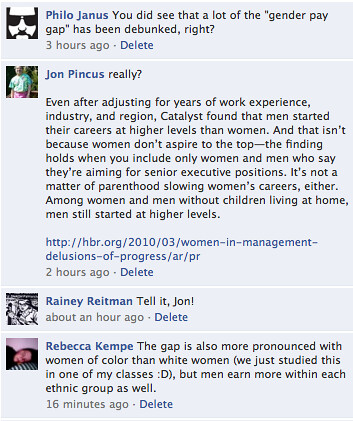Draft! Please do not link here!
Update, April 20: Rrevised version has been posted on Qworky’s blog, Better Software/Better World
We’re now only a week out—next Tuesday, April 20th will mark Equal Pay Day—the point in 2010 when the average woman’s wages finally catch up to her male counterpart’s salary from the prior year. It’s an opportunity to reflect on the movement for pay equity and the impact of unfair pay.
— Andrea Maruniak, National Women’s Law Center, on womanstake.org
Yeah really. Women working full-time, year-round are paid only about 77 cents for every dollar earned by men; in 2008, this meant the average “wage gap” was $10,622. For women of color, the numbers are even worse — African-American women earn 62 cents and Latinas earn 53 cents for every dollar paid to white, non-Hispanic men.
What would it mean if this wage gap didn’t exist — if, on the average, women were paid as much as men?
How real is the wage gap?
Conversations about this topic like the one Mikal kicked off on LinkedIn often fall into a familiar pattern. Sometimes guys who aren’t familiar with the data mistakenly attribute the wage gap to “obvious” but incorrect reasons.  Yes, it’s a complex situation with multiple causes. That said, Nancy M. Carter and Christine Silva’s recent Women in Management: Delusions of Progress from Harvard Business Review describes a reality that matches the experience of most women I know:
Even after adjusting for years of work experience, industry, and region, Catalyst found that men started their careers at higher levels than women. And that isn’t because women don’t aspire to the top—the finding holds when you include only women and men who say they’re aiming for senior executive positions. It’s not a matter of parenthood slowing women’s careers, either. Among women and men without children living at home, men still started at higher levels…. After starting out behind, women don’t catch up. Men move further up the career ladder—and they move faster.
What would it mean if the wage gap didn’t exist?
One way I think of it in terms of my female friends and colleagues. How different would they and their families’ lives be if they were fairly compensated? actionforeequity describes it far better than I can, discussing how the gap can mean the difference between a living wage and living in poverty, fewer obstacles to face between being trapped in an abusive relationship and getting out, being able to afford a college education, a reliable car to get her to and from work, a home of her own, medical insurance …
One of the things that’s changed since my #fairpay and Women Don’t Ask post from last year’s is that I now also look at this issue from the perspective of a software startup. Jennifer Hunt’s research, summarized in Why do Women Leave?, suggests that the single biggest contributor to the exodus of women from technology fields is that they’re dissatisfied with pay and promotion opportunities — and with numbers like these, who can blame them? And while it’s hard to know how much it contributes to the overall number, the investment patterns described in Restructure!’s White, male startup companies get money for being white and male further entrench these inequities. Without the wage gap, we’d have a much more diverse workforce, corporate cultures that were far more supportive to women — and a lot more women-led startups.
As xxxx said on the LinkedIn discussion,
“….”
Well said.
What do others think?
jon

Leave a Reply